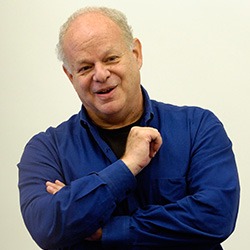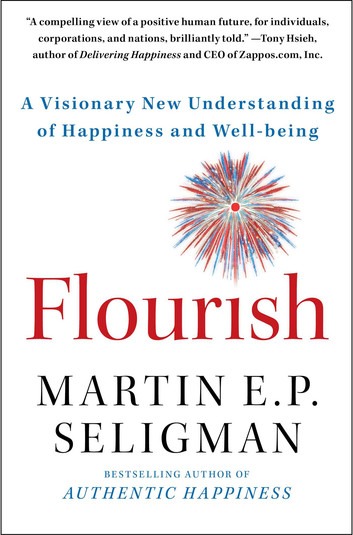Flourish Summary
6 min read ⌚
 Who Should Read “Flourish”? And Why?
Who Should Read “Flourish”? And Why?
Let’s face it: you’ve been a while on this planet, and you still haven’t found an answer to the most important question you can ever ask. Namely: how can you live your life as a happy person?
Martin E. P. Seligman has dedicated his whole life trying to answer that question for you. And he thinks that he went the furthest in his last book, aptly titled “Flourish.”
About Martin E. P. Seligman
Martin E. P. “Marty” Seligman is the Zellerbach Family Professor of Psychology at the University of Pennsylvania, a former president of the American Psychological Association, and the 31st most cited psychologist in the 20th century.
is the Zellerbach Family Professor of Psychology at the University of Pennsylvania, a former president of the American Psychological Association, and the 31st most cited psychologist in the 20th century.
He has written over twenty books, most of them in the field of positive psychology, of which he is the foremost promoter in the scientific community. The most celebrated among them are “Learned Optimism,” “Child’s Play,” and “The Optimistic Child.”
“Flourish Summary”
There are many self-help books on the market. And as much as some of them have an effect on you, rarely are these books written by real scientists.
Martin E. P. Seligman is an exception. A revered psychologist, he turned to writing self-help books only after coming up with few highly cited scientific theories which endorse the promotion and use of self-help methods.
The one he’s most associated with?
Positive psychology, a scientific field he named and basically founded, together with Christopher Peterson, and a certain Mihaly Csikszentmihalyi.
Its goal?
To scientifically study what makes life worth living.
Its results?
Nothing short of fantastic!
Here’s just one comparison to back that adjective up.
As many people suffering from anxiety and depression already know, “Prozac,” “Zoloft” and “Lexapro” are not just a myth – they actually help. However, what they don’t know is that it helps just a bit more than placebo. In numbers: two-thirds of patients got better after taking prescription drugs, but half of them experienced similar effects even though what they basically took was Tic Tacs!
As for positive psychology?
One week of specially developed treatments and exercises resulted in an almost unanimously confirmed six-month-lasting happiness! No prescription, no pills – just a good ol’ dose of gratitude and kindness.
But why should you believe Seligman?
Well, for one, as we said above, he is a scientist. And scientists are not allowed to suppose things like, say, philosophers are. By definition, they are skeptical and try to falsify their hypotheses until they are sure they are not lying.
Aristotle, Plato, Nietzsche – none of them had any idea if their ideas concerning human life and happiness are based in reality. They didn’t conduct experiments; they didn’t test their philosophies on real people.
Others have tried doing that but have chosen the wrong method. For example, life satisfaction questionnaires don’t work – because your answer will reflect your current mood in about 70 percent of the cases.
So, what does?
According to Seligman, it all starts with defining the elements of well-being. And in order for anything to be considered an element of human happiness, it needs to have three properties.
First of all – obviously – it needs to contribute to well-being. Secondly, the majority of people should pursue it for its own sake – not merely to get some other element. Finally, it can be defined and measured independently, not just in relation to other elements.
The outcome?
Seligman’s “Well-Being Theory,” which says that well-being consists of five elements. And you can easily remember them: you just need to remember the mnemonic, PERMA.
P stands for Positive Emotion. Warmth, comfort, pleasure – you name it, you know it.
E stands for Engagement. This is present only when we are entirely dedicated to doing something, so much so that we don’t even notice the time flying by. Csikszentmihalyi has named this state – the state of flow.
R stands for Relationships. Nobody can be happy if alone. You need a family, some friends, a partner; in other words – social connection and intimacy.
M stands for Meaning. This is why you hate your job. You want to belong to something you actually believe in, something which has a meaning bigger than you. And how does answering calls from 9 to 5 does this for anyone?
A stands for Accomplishment. Not accomplishment as in “I want to accomplish winning the lottery.” But an accomplishment as in “Hey, I didn’t understand this passage in the summary, but now I do. And that makes me happy!”
Key Lessons from “Flourish”
1. Leave Science to Deal with Your Well-Being
2. Human Well-Being Consists of Five Elements: Pursue Them!
3. When It Comes to Happiness, IQ and Wealth Mean Nothing
Leave Science to Deal with Your Well-Being
A long time ago, Aristotle wrote in the “Nicomachean Ethics” that the happy life is the good life. Because happiness, in his opinion, was the only thing humans wanted for its own sake. Money, beauty, friends, honor – humans want them so that they can be happy. And nothing more: they can’t be goals in themselves.
Most philosophers agreed with Aristotle and, consequently, spent their lives trying to find the equation for happiness. Their problem? They didn’t test their hypotheses. So, they were allowed to say absolutely anything – and be equally right.
Scientists can’t do this. Thus, their conclusions make much more sense.
Human Well-Being Consists of Five Elements: Pursue Them!
Positive psychologists have spent the last two decades trying to find out the definition of human happiness. Only recently, they successfully did. “Flourish” is the first book to present this new theory of human well-being, adding two more elements to the original three.
The result is a neat acronym, PERMA. In other words, well-being consists of five elements.
First of all, positive emotions. Excitement, awe, satisfaction, warmth, pride, joy – these all fall under this category. Secondly, it involves engagement – the state of deep, effortless involvement. The third element – relationships – is a no-brainer.
Meaning is all about purpose, i.e., finding your why. Finally, accomplishment means the pursuit of mastery and the joy of overcoming obstacles.
When It Comes to Happiness, IQ and Wealth Mean Nothing
What about intelligence? – you ask. Or money?
Surely, I can’t be happy if I don’t have a high IQ to understand happiness. Less so if I don’t have money to buy myself a helicopter – because, you see, I always wanted to fly one!
Well, IQ and money, it seems, have too little to do with well-being to be an element of its definition. In other words, if you have the five things stated above, you have enough IQ and money to be happy. If you lack just one, then – be an Einstein or a Tesla, if you will – all the money in the world won’t make you happy still!
We know it sounds cliché. But it’s true.
Science says so.
Like this summary? We’d like to invite you to download our free 12 min app, for more amazing summaries and audiobooks.
“Flourish” Quotes
To enable us to hear criticism nondefensively and to act creatively on it, we need to feel secure. Share on X One never knows if basic research is truly basic until one knows what it is basic to. Modern physics came into its own not because of its theories… but because physicists built the atomic bomb and modern nuclear power plants. Share on X The topic of positive psychology is well-being… the gold standard for measuring well-being is flourishing, and… the goal of positive psychology is to increase flourishing. Share on X The mood you are in determines more than 70 percent of how much life satisfaction you report and how well you judge your life to be going at that moment determines less than 30 percent. Share on X I’m trying to broaden the scope of positive psychology well beyond the smiley face. Happiness is just one-fifth of what human beings choose to do. Share on XOur Critical Review
Just like the two elements to the original theory proposed in “Authentic Happiness,” “Flourish” is a great addition to the positive psychology canon.
However, Seligman goes to great lengths to sell the main idea of the book – the PERMA-theory – and spends less time backing up his sale. This is not what we’ve grown accustomed to expect from Seligman.
But, nevertheless, it’s him – so there’s just about enough value in this book to add it to your next month’s to-read list.
Emir is the Head of Marketing at 12min. In his spare time, he loves to meditate and play soccer.


 Who Should Read “Flourish”? And Why?
Who Should Read “Flourish”? And Why?




